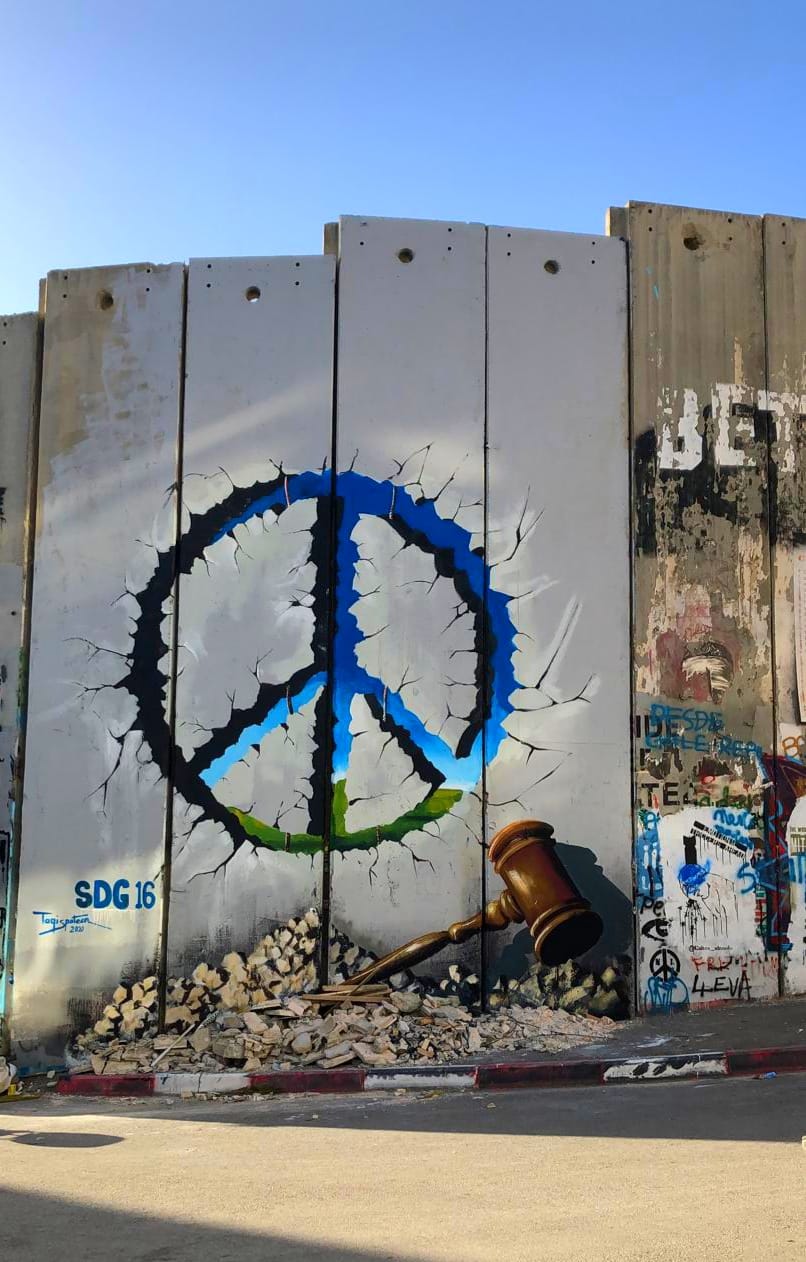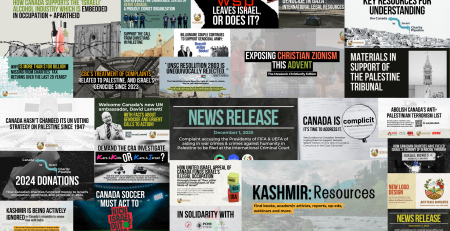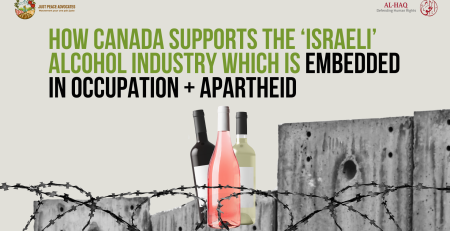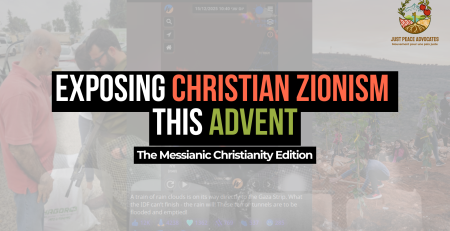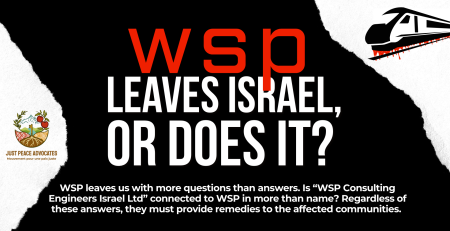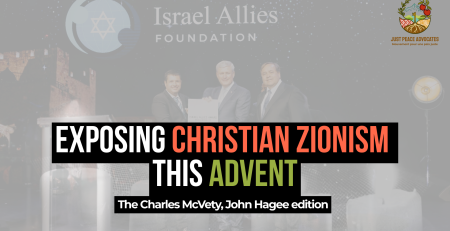The United Church of Canada (UCC) during its 44th General Council in July 2022 once again sidelined justice for Palestine, even as it global partner Sabeel Jerusalem said “one day under occupation is too long” to deny naming this injustice. After much posturing to delay action coming from its own UCC Task Force and to skuttle six regional resolutions, Omar Haramy from Sabeel Jerusalem, the sole voice from Palestine at the UCC General Council was put in a place of in his own words “begging” the church to name the injustice of apartheid as have international and Israeli human rights organizations. In this last intervention during the five-day conference. Haramy speaks of heartbreak, being speechless, and asking “what kind of Church are you?” Saying “wake up, what is wrong with you?”
Re-convening Sabeel-United Church of Canada consultation on policy
Response to United Church of Canada from Sabeel Jerusalem
This is the letter that was sent to the United Church of Canada from Sabeel in 2020 as part of the United Church of Canada Taskforce
Sabeel Jerusalem provided this letter to Just Peace Advocates with permission to post.
September 2020
To the United Church of Canada
We appreciate the opportunity to participate and comment on the reconsideration of the Policy statement of the UCC on Israel and Palestine, particularly as you listed Sabeel as one of your global partners in addressing your mission, “especially for those who suffer systems of injustice”. We particularly think it is very important for you to reconsider your position on the three issues raised, namely the recognition of Israel as a Jewish state, the use of the term apartheid, and the attitude towards BDS.
We think that this is a worthwhile endeavor at this particular point in time in light of the recent wave of Israeli legislation, including the “nation-state” law, as well as the publication of Trump’s Plan for the future of the area, as well as the apparent collapse of efforts towards the creation of a viable Palestinian state in the West Bank (including East Jerusalem) and Gaza, as contemplated by various two-state schemes.
At Sabeel, we are concerned that as you undertake this process, you are cognizant of our views on each of these issues as Christians who directly feel the consequences of the systems of injustice inherent in the current situation, who struggle, and have appealed to you, together with other Christians, regarding some of these very same issues, through various initiatives, including the Kairos Palestine document, which attempts to address these matters from a specifically Christian perspective, and which are worthy of being referenced in any updating of your official position.
1. Israel as a Jewish State
As for the recognition of Israel as a Jewish state, there has always been a serious theological and philosophical problem with the idea of a religiously denominated state, which would also apply to a designation of a state as being Jewish, Christian, or Muslim, without clear explanation of how such designation would affect the rights of those not belonging to that designated religion. Christ said my kingdom is not of this world, and a separation of church and state seems to be the one method of ensuring the rights of all, particularly in a society that includes believers of different religions, and those of different ethnicities. A recent spate of legislation made clear that in Israel, such designation is indeed intended to denigrate from the rights of non-Jews in that state. About 29 specific pieces of legislation were proposed or passed in the last few years confirming such discrimination, and were crowned by the Nation-State: Basic Law, which openly proclaims not only that Israel is a Jewish state, and the state of all Jewish people, but that it is specifically NOT the state of all its citizens, and that ONLY the Jewish people have the right of self-determination in the state of Israel. Non-Jewish Arab Palestinians today constitute half of the people living under Israel’s rule. Over 20% of its own citizens are also non-Jewish Arabs. How a state wants to be recognized as “Jewish” without discriminating against those is difficult to envisage on a legislative and theoretical level.
On a practical level, the impact is even greater. As an openly Jewish state, public lands, institutions and resources, important positions in government and industry, the ability to immigrate or visit the country, where a person may live, and what opportunities the state provides its citizens are openly determined by whether one is Jewish or not. The tremendous guilt over Western anti-Semitism, and the need for refuge in Palestine for Jews escaping the Holocaust whom the Western world would not accept or accommodate, initially led to the acceptance of the idea of a Jewish state, with little care for the rights of non-Jews already residing in that area. Now it is clear that such recognition and identity requires the state to discriminate against non-Jews, to deny the right of return, and to attempt to disenfranchise the non-Jewish population from participating in governance and self-determination as this would dilute or endanger the Jewish character of the state. Absent some clear evidence that the state can provide true equality to non-Jews, all expressions of recognition of its identity as a Jewish state constitute an open invitation for racism, discrimination and inequality towards non-Jews within its borders. It is no wonder that these calls are being heard more and more, as Israel shifts to a right-wing posture. We respectfully submit that the UCC should reconsider such designation. Security for its Jewish inhabitants and recognition of the state of Israel continues to be a clear interest for UCC, but the specific designation and recognition of Israel as a Jewish state is a slap in the face of Palestinian non-Jews, emboldens the racists and discriminators, and does not contribute to peace or justice. While the issue of Arab recognition of the Jewish nature of the state of Israel is a basic element in Trump’s Plan, it was never a requirement of the Egyptian, nor Jordanian peace treaties, and was not even mentioned in the Oslo agreements. I believe it would be problematic to include it as part of the policy of the UCC as it is totally unacceptable to Palestinians and seems to contribute to systematic inequality and discrimination against them.
2. Use of the term apartheid
“Apartheid” is now a well-defined legal concept that refers to a system of practices in a legally and legislatively sanctioned system, under which one group has policies and practices of segregation, separation and discrimination for the purpose of establishing or maintaining domination of one group against another and such policies include legislative measures designed to divide the population by the creation of separate reserves and ghettos for the members of one racial group or groups. This crime is prohibited under Protocol 1 of the Geneva Convention (1977) and is designated as a crime under Article 7 of the Rome Statute of the International Criminal Court. It is also prohibited under the International Convention on the Suppression and Punishment of the Crime of Apartheid adopted by the UN in 1973.
The three elements for such a crime are : (a) creating a regime for the domination by one group over another group, (b) by the creation of a separate and unequal system of governance to the detriment of the victim group and its members, and (c) committing various violations of the rights of the victim group including enslavement, forced transfer of the population, deportation, torture, persecution and other violations against any identifiable group based on political, national, ethnic cultural or gender grounds.
The question, therefore, is whether these elements exist in the West Bank, and not whether such language is acceptable to the dominant group using these policies.
In the West Bank today two distinct groups of civilians exist under the rule and control of Israel: the indigenous Palestinian Arab population and the Jewish settlers. Apart from the blatant illegality of these Jewish settlements under international law, and the fact that these settlements are largely established on lands stolen from the Palestinians, the system of governance in the West Bank itself clearly fits the legal definition of apartheid:
- Jewish settlers live in separate areas, where Jews live in all-Jewish areas where Arabs, including Israeli Arab citizens of Israel, are not allowed to live and West Bank Palestinians cannot enter without permission. These areas are continuously expanding leaving Arabs to live in limited ghettoes and reserves.
- Jews and Arabs live under separate legal systems, with Palestinian Arabs subject to military law, as well as Palestinian legislation, while settlers are only subject to Israeli civil law. They can neither be stopped by Israeli soldiers, Palestinian policemen nor brought before Palestinian civil courts or Israeli military courts, which have no jurisdiction over Jews.
- A separate system of police, health services, social welfare, public bus services, education, and municipal governance applies to each group, all of which are clearly favorable to the Jewish settlers. Both the systems themselves, and the consequences of applying them contribute to gross and systematic inequalities and unfairness and are enforced through oppressive coercive measures.
- A separate system of roads connects the Jewish settlements to each other and to Israel. Most of these roads are prohibited to Palestinian /Arabs whose areas are surrounded by Walls, cement blockades, and checkpoints, as well as “gates” controlling access.
The system is not only based on separation, but such separation is legally and legislatively mandated, and enforced by an oppressive system of control, and domination, including collective punishment, torture and imprisonment, administrative detention, deportations restrictions, and heavy-handed enforcement aimed at domination and control of the Arab population in favor and to the advantage of the Jewish settlers and the state of Israel. The Israeli army of occupation which controls all areas of lives for Palestinian Arabs has no authority over Jewish settlers but must intervene on their behalf if any tensions arise between the two groups.
If one does not believe the elements of this crime exists, then a discussion over this issue may be undertaken, and proper fact-finding may be called for. However, a wealth of information exists from Palestinian, Israeli and international human rights organizations to show that this is indeed the state of affairs. The maps put forth by the latest Trump Plan ( which only mirror the existing realities and plans to confirm them permanently), show a clear pattern of Bantustan-like enclaves for Arabs, swallowed up within an overwhelming system of Israeli control as was noted by the President of South Africa when he reviewed the said Plan.
If anything approaches a system of injustice creating suffering, it is this apartheid system in the West Bank. To call it by its proper name is the least that the UCC can do to combat its evil.
To recognize that such language is uncomfortable to the oppressor, who threaten to end conversations if the terms are even used, is to acknowledge the role of a prophetic witness. Surely it cannot be used as an excuse to avoid speaking the truth, just because the powerful would find it objectionable! How else do you address injustice if you cannot even call it by its proper name? To say that use of this terms also weakens elements calling for negotiated agreements, or hampers possibilities for a negotiated peace is to confirm the status quo and demand that Palestinians operate and negotiate only within the oppressive system that has been imposed upon them. The publication of Trump’s so-called Peace Plan confirms this fact very clearly. The UCC should not fall into this trap.
3. Boycotts, Divestment, and Sanctions (BDS):
It is clear that the UCC accepts the principles behind BDS as proper nonviolent tactics for addressing and combating the systematic injustices involved in the Israeli occupation and as legitimate tools for influencing Israeli policies. The objections against BDS containing maximalist elements is, in our view, misplaced.
The nature of the BDS movement has always been that it is highly decentralized and leaves it up to local groups to decide on the specific campaigns or activities they choose to pursue based on their local situation. Most BDS groups correctly target settlements, settlement goods, and corporations which benefit directly from the occupation. Others consider broader boycotts against Israel to influence it to change its policies in the occupied territories. As Israel continues to erase the Green Line, undermine the two-state solution, and annex more territories in order to solidify and confirm their forced integration into Israel, passes laws prohibiting distinctions between settlements and Israel, and refuses to label products of the settlements clearly, the distinction between addressing settlement Israeli products and investments, and those of Israel itself, become harder and harder to maintain. UCC policies need to acknowledge this reality and avoid being intimidated by the current efforts to demonize and criminalize the BDS movement and its supporters.
The essence of BDS is to provide an alternative nonviolent method for combating the evils of the occupation and pressuring Israel which has defied international law and international values. It also provides churches, and others with a means of promoting their values, when their own governments fail to pressure Israel into ending its occupation policies. Boycotts and divestment have been used against other countries, and their rulers have also had to face sanctions over human rights violations. Israel should not be exempt from such pressures and consequences.
4. Other Issues:
In addition to the three major issues noted above, the UCC Policy statement, while stating it does not wish to address specific acts of violence by either party, none the less specifically talks about Palestinian suicide bombing, which have thankfully practically ceased in the last few years but fails to address the weekly shooting of unarmed Palestinians by snipers on the Gaza border. The siege of Gaza and the horrible humanitarian conditions there, we respectfully suggest, warrants a specific mention in the UCC policy statement, to be relevant in 2020. You may also wish to address the Trump Plan, which specifically negates international law, confirms and legalizes settlements and annexation, and clearly undermines any possibility for a viable two-state solution. If you decide to do that, we would appreciate the opportunity of weighing in on these issues, besides the three you had suggested.
Omar Haramy
Sabeel Jerusalem
The Sin of Neutrality: Why Churches Must Unapologetically Take the Side of Palestine, January 31, 2023, Paul Salavadori, The Palestine Chronicle
Canadian churches must speak out against Israel’s apartheid crimes
by Khaled Mouammar in Rabble.ca
February 10, 2023
The United Church Task did not heed what they heard:
Other related posts:
Art: The Art of Occupied Palestine, Palestinian artist: Taqi Spateen, Read more about Taqi’s work

